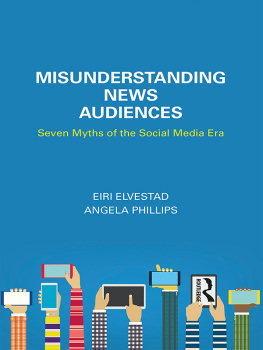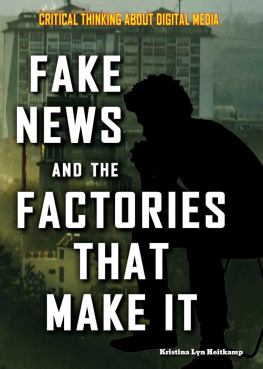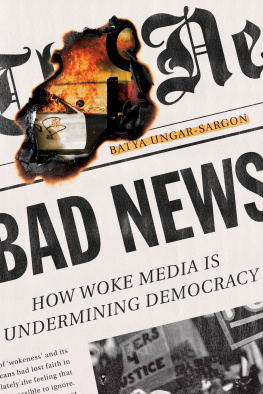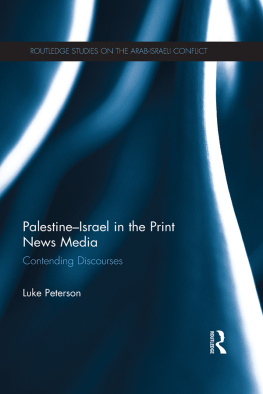Poor News
Discourse, Power and Society
Series editors: Martin J. Power, Amanda Haynes, Eoin Devereux and Aileen Dillane
Discourse is understood as both an expression and a mechanism of power, by which means particular social realities are conceived, made manifest, legitimated, naturalised, challenged, resisted and reimagined. This series publishes edited collections, monographs and textbooks which problematise the relationship of discourse to inequality, exclusion, subjugation, dominance and privilege. In doing so, the linkages between discourse, modes of social organization, lived experience and strategies of resistance are addressed.
Titles in the Series
Public and Political Discourses of Migration: International Perspectives, edited by Amanda Haynes, Martin J. Power, Eoin Devereux, Aileen Dillane and James Carr
The Discourse of Neoliberalism: An Anatomy of a Powerful Idea, Simon Springer
Poor News: Media Discourses of Poverty in Times of Austerity, Steven Harkins and Jairo Lugo-Ocando
Neighbours, Allies, Partners: Kazakhstan, Russia and the Discourse of Security, Aida Abzhaparova (forthcoming)
Poor News
Media Discourses of Poverty in Times of Austerity
Steven Harkins and Jairo Lugo-Ocando

London New York
Published by Rowman & Littlefield International Ltd
Unit A, Whitacre Mews, 2634 Stannary Street, London SE11 4AB
www.rowmaninternational.com
Rowman & Littlefield International Ltd. is an affiliate of Rowman & Littlefield
4501 Forbes Boulevard, Suite 200, Lanham, Maryland 20706, USA
With additional offices in Boulder, New York, Toronto (Canada), and Plymouth (UK)
www.rowman.com
Copyright 2018 by Steven Harkins and Jairo Lugo-Ocando
All rights reserved. No part of this book may be reproduced in any form or by any electronic or mechanical means, including information storage and retrieval systems, without written permission from the publisher, except by a reviewer who may quote passages in a review.
British Library Cataloguing in Publication Data
A catalogue record for this book is available from the British Library
ISBN: HB 978-1-7834-8926-8
Library of Congress Cataloging-in-Publication Data Is Available
ISBN 978-1-78348-926-8 (cloth: alk. paper)
ISBN 978-1-78348-928-2 (electronic)

The paper used in this publication meets the minimum requirements of American National Standard for Information Sciences Permanence of Paper for Printed Library Materials, ANSI/NISO Z39.481992.
Printed in the United States of America
We would want to acknowledge our gratitude with some institutions, colleagues, friends and family members who make this book possible. Firstly, our gratitude with the ESRC and the University of Sheffield which gave the funds for the PhD project that allowed us to gather the data compiled here. A particular thank-you to Professor Martin Conboy and Dr John Steel who at crucial moments were pivotal in the original project; their professional support and friendship proved to be invaluable. Thanks also to Dr Tony Harcup for his input. To Fiona, Frances, Claire, Liam, Tommy, Georgie, Molly, Duncan, Myshele and Graeme whose help and support was invaluable to Steven throughout the project and to Jairos three sons Edgar, Victor and Rafael, without whom life would make no sense at all. To them, we dedicate this book.
Contents
Introduction: Poverty in the Public Imagination
In 1985, the Los Angeles Times newspaper and the American Enterprise Institute conducted a poll among 1,202 adults in the United States, to find out what people thought about poverty and government efforts to combat it. In 2016, they repeated the same poll. One of the most striking findings was that those living in poverty and those better off have consistently shared many of the same values about individual work and the governments responsibility in relation to poverty. Moreover, despite increasing levels of inequality and the contraction of the state under neoliberalism since the Regan-Thatcher era, most people regardless of their social status and class have now lost almost all confidence in the governments ability to combat poverty. In fact,
The 2016 poll shows some evidence of disillusionment with government antipoverty programs. Only 5 percent of Americans and 8 percent of the poor believe government efforts to fight poverty have had a big impact. A surprising 34 percent of the public thinks government efforts have actually made things worse for the poor, and 13 percent say they have not had any impact at all. Among the poor those in a position to know 40 percent say government programs have made things worse, and 12 percent see no impact. When the 1985 survey asked about the results of the War on Poverty initiated by President Lyndon Johnson in 1964, only 11 percent thought it had made things worse, and 17 percent saw no impact. (Lauder and Lauter 2016)
Over the past three decades, public perceptions regarding poverty and public welfare have become more and more convergent among the public who tend to think not only that the government is unable to address poverty but that its actions tend to make things worse. These views have become increasingly shared by large segments of the population despite all the evidence to the contrary and regardless of the individual and collective experiences of those who have benefited from government intervention. Instead, it seems, people are more inclined to believe that individual effort and the private sector can do better at alleviating poverty.
So, the question remains, why do people choose to believe and share certain worldviews despite the evidence and sometimes against their own personal experiences. The answer, as we will explore in this book, is twofold. Poverty has been constructed in the public imagination by specific cultural agents as a social reality which has more to do with ideology than empirical evidence. One that provides an explanation based on common sense (Rosenfeld 2011:189) and that offers a type of explanatory simplicity and common sense rationality that has proven to be so appealing that many people, regardless of their background and social class, have embraced it uncritically. Election after election, whole sections of the working-class electorate have voted for political parties and governments that promise and implement tougher austerity measures and lower taxes for the richest, while delivering along that path impunity for the instigators of political failure, less regulation for bankers and tax havens for large corporations that were responsible for the recent global financial crisis.
However, this is not a new conundrum. In fact, when asking himself how it was possible for the Italian masses to vote for Fascism and parties of the elite, Antonio Gramsci (18911937) developed his theory of cultural hegemony, according to which the ruling capitalist class the bourgeoisie uses cultural institutions to maintain power (Gramsci 1971 [1935]). In it, he argued that in so doing, the ruling class was able to develop a hegemonic culture by using ideology rather than violence and coercion. These cultural institutions, he added, helped to propagate certain values and norms which then became anchored in the public imagination as common sense values that underpinned and protected the status quo of the elites. Accordingly, this cultural hegemony was produced and reproduced by the dominant class through the institutions that form the superstructure and among which, we should add, the news media is one of the key cultural institutions in modern times.









 The paper used in this publication meets the minimum requirements of American National Standard for Information Sciences Permanence of Paper for Printed Library Materials, ANSI/NISO Z39.481992.
The paper used in this publication meets the minimum requirements of American National Standard for Information Sciences Permanence of Paper for Printed Library Materials, ANSI/NISO Z39.481992.